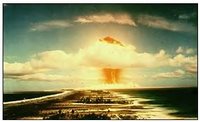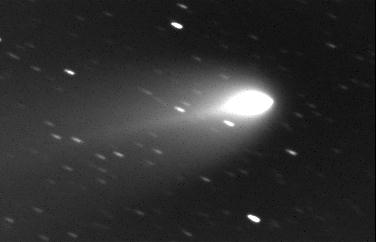YAHOO! News reporta que Eric Julien –un ex controlador de vuelos del ejercito frances—ha declarado que el cometa 73P Schwassmann chocará contra nuestro planeta el 25 de Mayo creando gran caós y destrucción.

Para agregar un elemento bizarro a estas noticias Julien afirma que Bush aprovechará esta fecha para lanzar un ataque nuclear contra Iran.
¿Suficientemente bizarro? Hay más. Julien esta convencido que el cometa 73P Schwassmann ha seguido un curso elíptico al rededor de la tierra por siglos pero que en 1995 se fragmentó, misteriosamente. Esta convencido que en este mismo año la desaparición de un Crop Circle llamado “Missing Earth” (esos dibujos hieroglíficos inexplicables en los campos de Inglaterra) era una advertencia de inteligencias extraterrestres sobre nuestras eradas políticas nucleares.
 Imagen: fuente
Imagen: fuente
¡Acuérdense! Lo escucharon por primera vez en FUTURATRONICS.
Vean el ensayo de Julien: "May 25, 2006: The Day of Destiny"
Via: Fortean Times


2 comentarios:
Thu Apr 13, 7:00 AM ET
To: National Desk
Contact: Dr. Michael Salla of the Exopolitics Institute, 808-323-3400, drsalla@exopoliticsinstitute.org
KEALAKEKUA, Hawaii, April 13 /U.S. Newswire/ -- Eric Julien, a former French military air traffic controller and senior airport manager, has completed a study of the comet 73P Schwassmann- Wachmann and declared that a fragment is highly likely to impact the Earth on or around May 25, 2006.
Comet Schwassman-Wachmann follows a five-year orbit that crosses the solar system's ecliptic plane. It has followed its five year orbit intact for centuries; but, in 1995, mysteriously fragmented. According to Julien, this is the same year that a crop circle appeared showing the inner solar system with the Earth missing from its orbit. He argues the "Missing Earth" crop circle was a message from higher intelligences warning humanity of the consequences of its destructive nuclear policies. He links this crop circle to May 25, 2006, and identifies the comet Schwassmann-Wachman as the subject of higher intelligence communications.
Using NASA simulations of the comet's path, Julien concludes that impact is likely around May 25 precisely when the comet crosses the Earth's ecliptic plane. While the first fragment will cross at approximately 10 million miles, lagging fragments threaten to collide. While astronomers have stated that the comet poses no direct threat, Julien argues that some fragments are too small to observe. Astronomers have predicted possible meteor showers indicating some cometary debris will enter the atmosphere.
Julien argues that the kinetic energy of even a 'car sized' fragment will impact the Earth with devastating effect. He concludes the May 25 event is tied in to the Bush administration's policy of preemptive use of nuclear weapons against Iran, and the effect of nuclear weapons on the realms of higher intelligences. Regarding its importance, Julien declares: "we have to save lives when we have such information to share with the public". He further claims it important "to preserve all data, historical artifacts and precious material in the event of such a collision." Julien predicts that the comet collision will occur in the Atlantic Ocean between the Equator and the Tropic of Cancer, and generates 200 meter waves. Julien concludes that "each person with this information has to take responsibility to warn potential victims."
His article, "May 25, 2006: The Day of Destiny" is available at: http://www.exopoliticsinstitute.org/EricJulien-En.htm
Sponsored by the Exopolitics Institute: http://www.exopoliticsinstitute.org
http://www.usnewswire.com/
/© 2006 U.S. Newswire 202-347-2770/
http://news.yahoo.com/s/usnw/20060413/pl_usnw/former_military_air_traffic_controller_claims_comet_collision_with_earth_on_may25_2006104_xml
Bush declines to exclude nuclear strike on Iran By Edmund Blair
Tue Apr 18, 6:13 PM ET
President Bush refused on Tuesday to rule out nuclear strikes against Iran if diplomacy fails to curb the Islamic Republic's atomic ambitions.
Iran, which says its nuclear program is purely peaceful, told world powers it would pursue atomic technology, whatever they decided at a meeting held in Moscow on Tuesday.
That meeting ended without any substantial results, a source close to the negotiations told Interfax late on Tuesday.
Iran's defiance of world pressure to halt the program drove oil prices to a record high of $72.64 a barrel, raising fears of a cut in supplies from the world's fourth biggest crude exporter.
Bush said in Washington he would discuss Iran's nuclear activities with China's President Hu Jintao this week and avoided ruling out nuclear retaliation if diplomatic efforts fail.
Asked if options included planning for a nuclear strike, Bush replied: "All options are on the table. We want to solve this issue diplomatically and we're working hard to do so."
Speculation about a U.S. attack has mounted since a report in New Yorker magazine said this month that Washington was mulling the option of using tactical nuclear weapons to knock out Iran's subterranean nuclear sites.
The United States, which accuses Iran of seeking atom bombs, had been expected to push for targeted sanctions against Tehran during the Moscow meeting with the U.N. Security Council's other permanent members -- Britain, France, China and Russia -- plus Germany.
Russia and China oppose sanctions and five of the six states oppose the use of force. The U.S. has left it open as an option.
DEADLINE
Deputy foreign ministers met in Moscow ahead of an end-April deadline for the International Atomic Energy Agency (IAEA) to report on whether Iran is complying with U.N. demands that it halt uranium enrichment.
"Whatever the result of this meeting might be, Iran will not abandon its rights (to nuclear technology)," Iran's Foreign Ministry spokesman Hamid Reza Asefi said before the meeting ended.
In Washington, State Department spokesman Sean McCormack said that preliminary discussions in Moscow had indicated "there is wide agreement on the fact that Iran can't be allowed to possess the means to develop a nuclear weapon."
But McCormack made a point of stressing no major decisions would be taken in Moscow and the meeting's goal was to make preparations for decisions to be taken in various capitals.
UnderSecretary of State Nicholas Burns canceled a news conference that had been scheduled to take place after the talks ended. No reason was given.
Iran defied U.N. demands by declaring last week it had enriched uranium to a level used in power stations and was aiming for industrial-scale production, ratcheting up tensions.
The United States, which already enforces its own sweeping sanctions on Iran, wants the Security Council to be ready to take strong diplomatic action, including so-called targeted measures such as a freeze on assets and visa curbs.
Washington says it does not want to embargo Iran's oil and gas industries to avoid creating hardship for the Iranian people.
CHINA, RUSSIA OPPOSE SANCTIONS
China, which sent an envoy to Iran on Friday to try to defuse the standoff, repeated a call for a negotiated solution.
"We hope all sides will maintain restraint and flexibility," Chinese Foreign Ministry spokesman Qin Gang said in Beijing.
Russia restated its opposition to punitive action. "We are convinced that neither the sanctions route nor the use of force route will lead to a solution of this problem," Foreign Ministry spokesman Mikhail Kamynin said, Itar-Tass news agency reported.
Russian Foreign Minister Sergei Lavrov urged Iran to suspend its research and development efforts to enrich uranium in a telephone conversation with Iranian Foreign Minister Manuchehr Motaki on Monday, Interfax said.
U.S. Senator Joe Lieberman, a member of the Senate Armed Services Committee, told Israel's Jerusalem Post the United States probably could not destroy Iran's nuclear program but could attempt to set it back by strikes as a last resort.
"I think the only justifiable use of military power would be an attempt to deter the development of their nuclear program if we felt there was no other way to do it," he said.
Iranian President Mahmoud Ahmadinejad, speaking at an annual military parade, said the army was ready to defend the nation.
"It will cut off the hands of any aggressors and will make any aggressor regret it," Ahmadinejad declared.
Iran says it will not drop its right to enrich uranium for peaceful use but that it will work with the IAEA.
The U.N. nuclear watchdog says it has been unable to verify that Iran's nuclear program is purely civilian but has found no hard proof of efforts to build atomic weapons.
IAEA inspectors are due in Iran on Friday to visit nuclear sites, including one at Natanz where Iran says it has enriched uranium to 3.5 percent, the level used in nuclear power plants.
IRNA news agency said Olli Heinonen, ElBaradei's deputy for safeguards issues, would lead the team. One diplomat said his presence suggested Iran might provide some missing information.
Experts say it would take Iran years to produce enough highly enriched uranium for one bomb from its current 164 centrifuges. But Iran says it will to install 3,000 centrifuges, which could make enough material for a warhead in one year.
(Additional reporting by Parisa Hafezi and Alireza Ronaghi in Tehran, Guy Faulconbridge in Moscow, Mark Heinrich in Vienna)
Copyright © 2006 Reuters Limited. All rights reserved. Republication or redistribution of Reuters content is expressly prohibited without the prior written consent of Reuters. Reuters shall not be liable for any errors or delays in the content, or for any actions taken in reliance thereon.
Copyright © 2006 Yahoo! Inc. All rights reserved.
Questions or Comments
Privacy Policy -Terms of Service - Copyright/IP Policy - Ad Feedback
http://news.yahoo.com/s/nm/20060418/ts_nm/nuclear_iran_dc_18&printer=1;_ylt=Agk0JPQacWNNHcBshbeNjsZg.3QA;_ylu=X3oDMTA3MXN1bHE0BHNlYwN0bWE-
Publicar un comentario